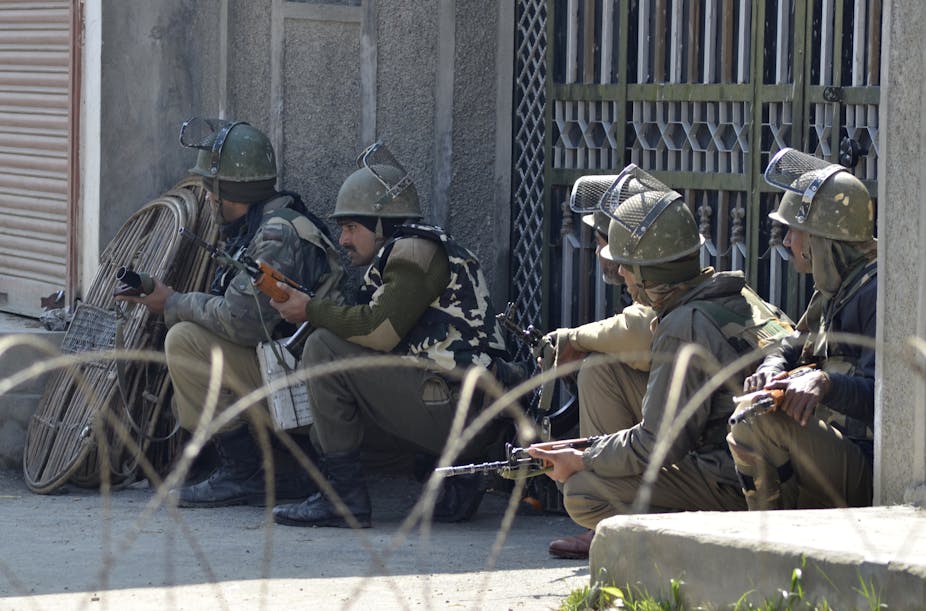India is at the polls to elect the 16th Lok Sabha – the lower house of the Indian parliament. The outcome will decide the fate of the next government in New Delhi, and the Bharatiya Janata Party (BJP) is predicted to form a new government.
The BJP’s manifesto was released on the eve of the election on April 7. The BJP has given top priority to economic development, curbing corruption and job creation.
On security matters the BJP promises “zero tolerance” on terrorism, strengthening intelligence systems and increasing defence production. But its pledge to reconsider India’s nuclear doctrine of no first use and update it to meet current challenges has attracted international attention. Some might consider it as election rhetoric, but it might imply a shift away from India’s policy of no first use of nuclear weapons.
The BJP has a revivalist agenda of regaining India’s ancient glory and rightful place in the world, and is sensitive to a looming dual security threat from China and Pakistan.
History of India’s nuclear weapons policy
India has been advocating complete nuclear disarmament since the arrival of the nuclear issue on the international stage. However, India refused to sign the Nuclear Non-Proliferation Treaty (NNPT) because it considered the NNPT as promoting nuclear apartheid in allowing the “Permanent Five” (US, UK, China, France and Russia) to keep their nuclear arsenals.
The NNPT also undermined India’s security in the face of a nuclear China and China and Pakistan’s “all weather friendship”.
India planned nuclear tests in 1974 to show its nuclear technology capability and scientific progress but chose to continue with its non-nuclear weapon status.
When the BJP came to power as part of a coalition in 1998 it went ahead with its promise of declaring India a nuclear weapon state. India detonated nuclear tests in May 1998. Pakistan responded by making its covert nuclear program overt and conducting nuclear tests. A nuclear stand-off evolved in south Asia.
India’s nuclear doctrine’s objective states:
The fundamental purpose of Indian nuclear weapons is to deter the use and threat of use of nuclear weapons by any State or entity against India and its forces. India will not be the first to initiate a nuclear strike, but will respond with punitive retaliation should deterrence fail. India will not resort to the use or threat of use of nuclear weapons against States which do not possess nuclear weapons, or are not aligned with nuclear weapons powers.
Geopolitical context
The latest National Bomb Data Centre statistics say India is the most dangerous country in the world in terms of terrorist bombings per year, next to Iraq and Pakistan.
There is increasing friendliness between Pakistan and China on nuclear and defence issues: the latest Stockholm International Peace Research Institute (SIPRI) report states that 54% of Chinese arms exports go to Pakistan. This partnership is worrying for India.
Also, the exit of US forces from Afghanistan late this year is likely to trigger a contest between India and Pakistan for influence in Afghanistan, which could make the rivalry worse. India might have to face a dual challenge from China and Pakistan, as China too has economic and strategic stakes in Afghanistan.
These scenarios are compelling India to be more assertive in its foreign policy. The revision of its no first use of nuclear weapons policy to deter its adversaries could be part of BJP’s future strategy if the party wins power.
Domestic political context
China’s recent military aggression towards India and its constant nuclear and defence support to Pakistan – and the incumbent Congress government’s feeble response to China – haves further prompted BJP to reconsider its no-first-use stance.
It may be considered as poll rhetoric targeting the youth vote. About 50% of India’s population is under the age of 25, and its middle class is expanding and becoming increasingly aware of their country’s rising economic and military profile. Both want self-respect for India.
The failure of the Congress government to respond to the terrorist attacks, Pakistan’s continued arrogance and refusal to act against terrorist outfits in their country and the recent aggressive posture of China and its military adventurism at Indo-China borders all combine to alarm Indians.
The closing section of the BJP’s manifesto, which deals with foreign policy, emphasises India’s goal of achieving its rightful place in the world through the centuries-old tradition of “Vasudhaiva Kutumbakam” (the world is a family).
But the BJP’s emphasis on creating a web of allies based on mutual interests, and its rethink on India’s no-first-use nuclear doctrine, are shifts from the nation’s long tradition of non-alignment to more realist tenets of foreign policy to deal with geostrategic threats in its neighbourhood.
It is likely that BJP, under the leadership of Narendra Modi, a hardliner and economic performer who would like to enhance India’s trade ties with its near neighbours, might adopt a pragmatic posture even towards China. In case of border disputes or any misadventures by its adversaries, it might not continue the strategic restraint shown by the Congress government.

